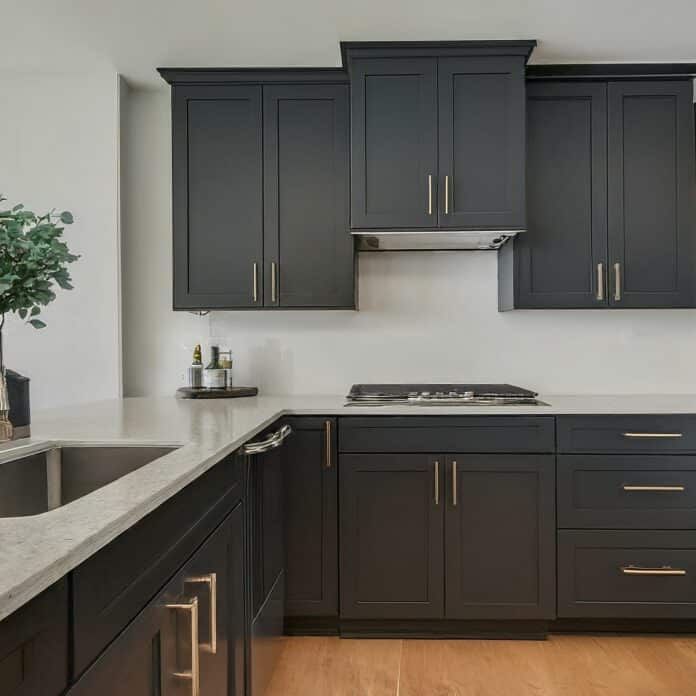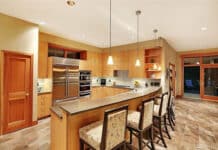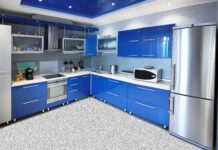Shaker-style cabinetry is an integral part of many modern kitchens and baths. It is a cabinet style that has been historically celebrated due to its charm, elegance, and practicality.
Shaker cabinets are more than just storage spaces. They reflect a timeless aesthetic and practical function rolled into one. Named after the Shaker furniture tradition, they thrive on a minimalist lifestyle and quality craftsmanship.
They can be compartmentalized into different sections using specific elements.
What Does a Shaker Cabinet Look Like
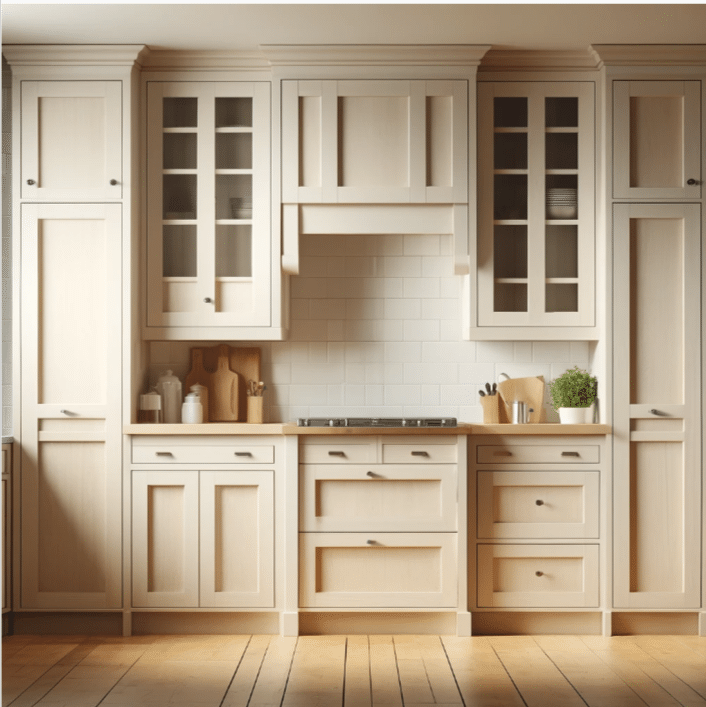
Picture a piece of hardwood shaped like a picture frame, complete with a recessed center panel framed by four pieces of wood.
It is also known as ‘rails’ and ‘stiles,’ as these pieces of wood have distinguished Shaker-style flat-panel doors from other cabinet styles over centuries.
Main Features of Shaker Style Cabinets
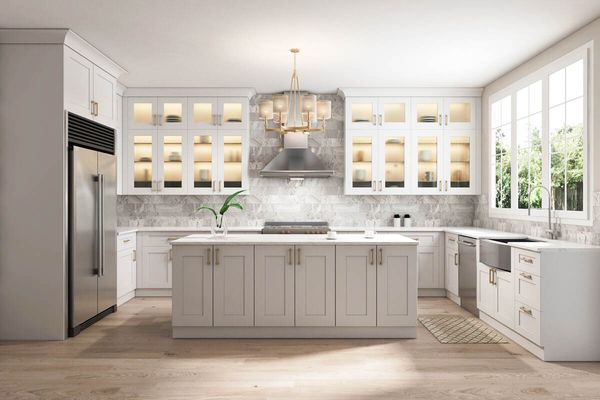
Overall, simplicity and clean lines, similar to a picture frame, characterize Shaker-style cabinets.
They feature a door with a recessed center panel framed by four pieces of wood termed “rails” and “stiles.”
Shaker cabinet doors are often described as both traditional and stylish, with a touch of elegance that stems from simplicity. They offer both visual appeal and practical functionality, making them a staple in various kitchens and bathrooms.
Shaker cabinet styles are renowned for their practicality, charm, and elegance, fitting seamlessly into both cool and extravagant kitchen designs with their versatile color and design options.
Shaker Cabinets Design Elements
Shaker cabinet design is more than a mere assembly of wood pieces. It encompasses several design elements that give the cabinets their uniqueness and timeless charm.
Let’s delve into some of them.
Simplistic Design
The hallmark of Shaker cabinets is their minimalistic design. Without an overload of elaborate trims, carvings, or fixtures, these cabinets maintain an attractive simplicity that fits in with various interior styles.
Clean Lines
Shaker-style cabinets boast clean and straight lines, thanks to their recessed panel doors and drawer fronts. This attribute lends a neat, composed look to your kitchen or bathroom.
Recessed Panel Doors
Recessed panel doors are a defining feature of Shaker cabinets, which have a depressed center panel that is lower than the outer door frame.
This design element naturally draws the eye, adding depth without overwhelming the overall aesthetics.
Neutral Colors
Shaker cabinetry often comes in neutral colors that lend a soothing, understated vibe to the kitchen.
Varied Finish Options
Shaker cabinets offer a range of finish options, including natural wood, stained, painted, and glazes. The choice of finish can dramatically change the look of the cabinets, catering to different decor preferences.
Durability and Functionality of Shaker Cabinets
Supplementing their beauty, Shaker-style cabinets are renowned for their durability and functionality. The cabinet boxes are typically constructed from high-quality plywood such as marine or boiling waterproof plywood.
This emphasis on using solid materials greatly enhances their lifespan, making them a worthy long-term investment for your home.
In addition, their design inherently focuses on practicality, avoiding extraneous details that could compromise their function. The simplicity of their design also makes cleaning and maintenance easy.
Their warp-resistant structure, precise joinery, and solid construction ensure that they can withstand daily wear and tear, providing you with faultless functionality year after year.
Variation of Colors
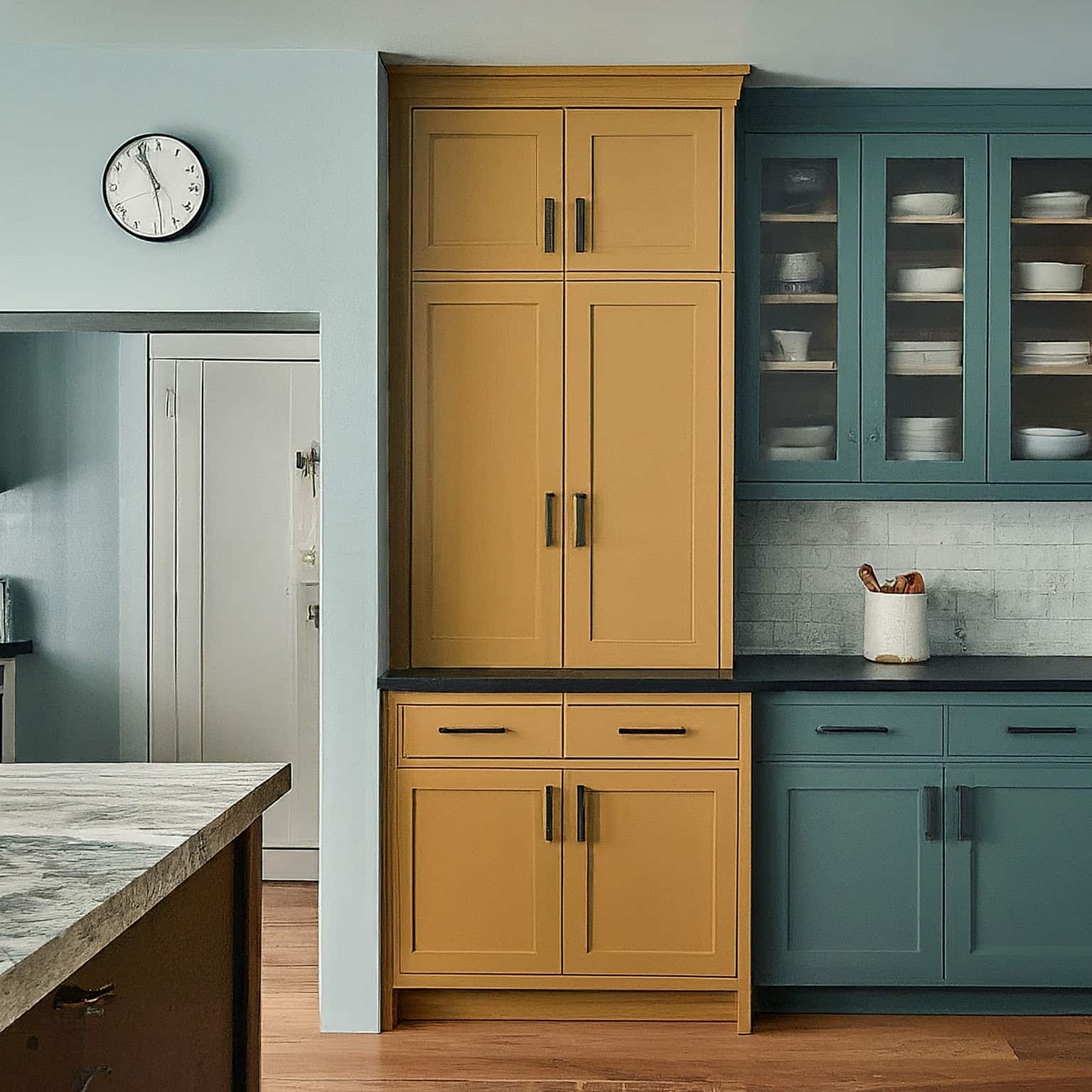
Shaker kitchen cabinets offer a diverse range of color options to suit various design preferences. From classic whites to warm neutrals and rich wood tones, their versatility allows you to customize your kitchen space effortlessly.
Whether aiming for a modern, farmhouse, or traditional aesthetic, shaker cabinets’ array of color choices caters to every style. This color flexibility lets you create a personalized touch of elegance in your design.
How Shaker Style Cabinets Are Made?
Shaker-style cabinets aim for simplicity and quality craftsmanship, staying loyal to their traditional roots. Each cabinet consists of five pieces, namely, one recessed center panel and four pieces to frame it.
These pieces, known as the rails (horizontal pieces) and stiles (vertical pieces), are joined together using quality joinery, creating a sturdy and reliable structure.
The use of solid wood ensures the cabinets’ resilience and longevity, making them a reliable and stylish addition to any home.
Materials Used in Shaker-Style Cabinetry
Shaker cabinets can be constructed from various wood species, significantly influencing their final appearance and durability. Here’s a comparison of some common materials used.
Hardwood
Maple and cherry are common traditional choices for shaker cabinets. They are known for their high durability and beautiful grain impressions. The center panel, however, comes with MDF and veneer.
MDF
MDF (Medium-Density Fiberwood) is a popular alternative to hardwood. It has excellent paint adherence and a smooth finish. It is cheaper than solid wood cabinets but less durable.
Particleboard
Made of composite materials like woodchip, sawdust, and small pieces of wood. Pre-laminated and much cheaper than plywood and hardwood.
Each material has its strengths and limitations, and the choice depends on factors such as budget, aesthetics, and usability requirements.
Manufacturing Process
The manufacturing process of shaker-style cabinets involves a blend of precision and craftsmanship. It commences with selecting suitable material, followed by precise cutting to create the frames and center panel.
Most shaker-style kitchen cabinets are ready-to-assemble. Ready-to-assemble (RTA) cabinets are a cost-effective and versatile option for kitchen or bathroom renovations.
They are shipped in flat-pack boxes with all the components and hardware needed for assembly, making them easy to transport and store.
RTA cabinets are available in various styles and materials, including wood, laminate, and thermofoil.
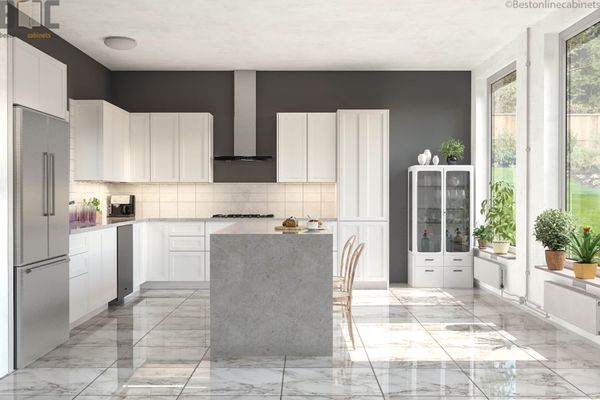
This allows for customization and flexibility in design while maintaining affordability. They are particularly popular among DIY enthusiasts because they require minimal tools and skills to assemble.
Deciding the Design
When deciding on the design of your shaker cabinet and drawers, consider their clean lines and timeless charm. Opt for classic white shaker cabinets for a touch of elegance, or explore transitional styles for a modern twist.
We also recommend you choose between traditional center panel doors or sleek slab fronts for a minimalist look. Select cabinet hardware that complements your overall kitchen design.
Ultimately, the design of your shaker cabinets should reflect your style and enhance the aesthetic of your home.
Shaker-Style Cabinet Types
While the simplistic nature of Shaker cabinets remains consistent, numerous variations cater to diverse style preferences.
Manufacturers use striking techniques in construction and finishing, resulting in differences in frame thickness, joinery, and overall aesthetics.
Shaker cabinets offer many possibilities for creating a personalized kitchen or bathroom space. Modern shaker-style cabinets are particularly noted for their clean lines, versatility, and suitability for modern and transitional styles.
They emphasize how variations in finish, hardware, and color choices can create a contemporary appearance while maintaining the classic Shaker design ethos.
Inset Shaker Cabinets
Inset Shaker Cabinets are a variation that seamlessly blends the essence of a true shaker style with a built-in look.
In this design, the doors and drawer headers are fitted inside the cabinet face frame, presenting a clean, smooth front.
This feature enhances the simplicity of the cabinets, making them an ideal match for contemporary kitchen styles.
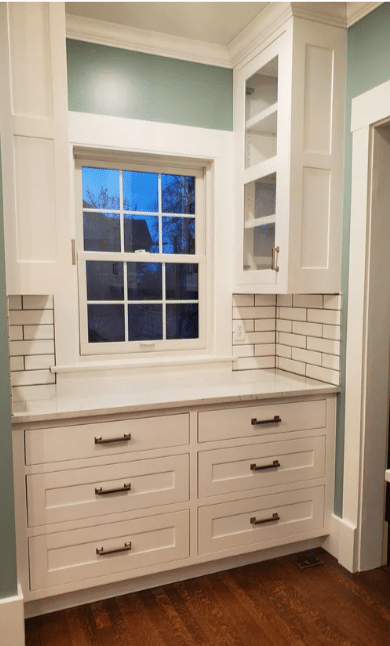
Inset cabinets add an aesthetic charm to your kitchen or bath area while complementing the underlying principle of functionality associated with Shaker cabinetry.
Overlay Shaker Cabinets
Overlay Shaker cabinets consist of doors and drawer headers slightly larger than the door opening. This design results in an overlay on the cabinet frame when closed.
Different overlay options, including partial and full overlays, are available.
Full-overlay cabinets provide a sleek, nearly seamless appearance, making them an attractive option for modern kitchens.
Partial overlay cabinets, on the other hand, offer more of the traditional charm, revealing some portion of the frame.
Whether you prefer full or partial overlay, both designs maintain the characteristic clean lines and functionality that distinguish Shaker-style cabinets.
Frameless Shaker Cabinets
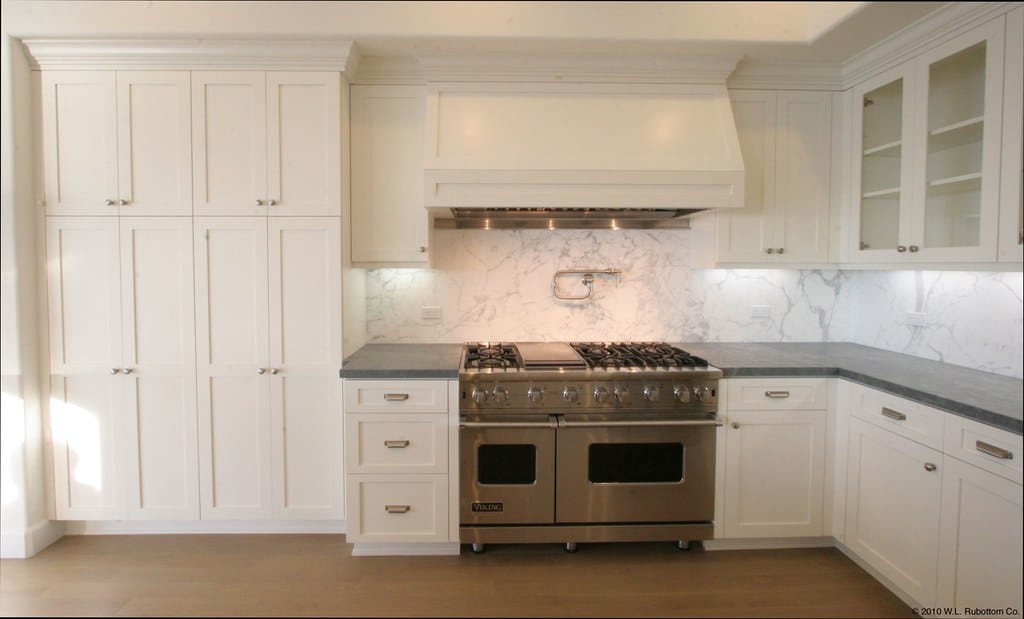
Also known as “full-access” or European cabinetry, frameless Shaker cabinets stand out with their contemporary appeal.
These cabinets are built without a face frame, a design choice often found in sleek, modern designs.
This structure enhances the clean lines” outlook, maximizing storage space and highlighting the elegance of simplicity.
Some manufacturers even offer frameless cabinets with slab doors, which are totally flat panels devoid of stiles or rails.
While this variation of Shaker cabinets can be considered a departure from the traditional look, it’s a testament to the versatility of the Shaker style, providing homeowners with ample choice to match their aesthetic preferences.
Modern, Farmhouse, and Traditional Designs
The beauty of shaker-style kitchen cabinets lies in their ability to adapt to different design styles, seamlessly transitioning from modern to farmhouse to traditional aesthetics.
In a modern design, the clean simplicity of Shaker cabinets pairs perfectly with minimalist decor and crisp, geometric forms.
Various color choices create stark contrasts, with white cabinets against dark countertops offering a visually striking appeal.
A farmhouse style embraces the rustic charm of Shaker cabinets, which are often complemented by natural wood finishes and warm colors.
The practicality of these cabinets resonates with the farmhouse’s focus on comfort and functionality, making them a perfect fit.
In a traditional setting, Shaker cabinets complement the decorative richness of the overall design. They provide a touch of subtlety without overshadowing the ornate details that characterize traditional style.
The neutral colors of Shaker cabinets can also balance the vibrant hues usually associated with traditional interiors, creating a harmonious blend of old-world charm and contemporary simplicity.
Types of Shaker Cabinet Finishes
The finish of a Shaker cabinet can greatly influence its final look and feel, making it an essential element in your design choices.
Many finish options are available, including painted, burnished, thermofoil, and polyurethane finishing.
Each type of finishing has its unique aesthetic characteristic, adding depth, texture, and personality to your cabinets.
Whether you’re aiming for a natural wood look, a sleek contemporary appeal, or a luxurious high-end feel, the right finish can make your Shaker cabinets truly stand out.
Painted Finishing
Painted finishes offer a smooth, uniform look for shaker-style cabinetry. Paint’s versatility lets you choose from a wide spectrum of colors, seamlessly matching your cabinets with your overall decor theme.
There are various options to choose from, from crisp whites and neutral grays to bold, vibrant hues.
Painted Shaker cabinets lend a clean, contemporary feel to any kitchen or bathroom. Paint offers excellent adhesion and durability, making it a practical choice for areas prone to moisture and temperature changes.
When done correctly, a high-quality paint job can enhance the cabinet’s lifespan, resisting wear and tear while maintaining its elegant appearance over time.
Burnished Finishing
Burnished finishing results in a patina of age and use on shaker cabinets. This process involves distressing and sanding painted cabinets and adding a burnishing stain to create an antique or aged effect.
This finish can add a touch of rustic charm to your Shaker cabinets, making them ideal for farmhouse or vintage-themed interiors.
In addition, burnishing also enhances the cabinets’ visual depth and surface texture, infusing them with a unique character and warmth.
It is important to note that burnishing requires skillful application and may not be suitable for all cabinet materials. When considering this finish, it is recommended to seek expert advice.
Thermofoil Finishing
Thermofoil finishing, also known as vinyl wrap, is a modern approach to enhancing shaker cabinets’ durability and visual appeal.
This process involves heat and pressure application to cover the cabinet surfaces with a thin, durable layer of vinyl.
Thermofoil finishes offer several advantages. They provide a smooth, grainless look that is ideal for contemporary and minimalist spaces.
Thermofoil finishes are also moisture-resistant, making them well-suited for humid or high-usage areas.
However, thermofoil finishes require careful handling as they can peel or chip over time if not properly cared for.
Therefore, it’s essential to consider your cabinets’ expected usage and maintain them appropriately when opting for thermofoil finishes.
How to Choose the Right Shaker Style Cabinets for the Kitchen?
Choosing the right Shaker cabinets involves more than just picking out a style you like. It requires balancing aesthetics, functionality, and fitting into your home’s overall interior design.
You should also consider some factors like color preferences, wood options, hardware selection, and, of course, your budget.
Let’s look at the most important factors in choosing your shaker kitchen cabinets:
Shaker cabinets can complement both traditional and contemporary kitchen designs, making them a versatile choice for homeowners looking to blend traditional styles with modern functionality.
Popular Colors and Wood Options
Regarding colors and wood options, Shaker cabinets offer many choices to suit various design preferences. Here are a few popular ones:
White and Gray
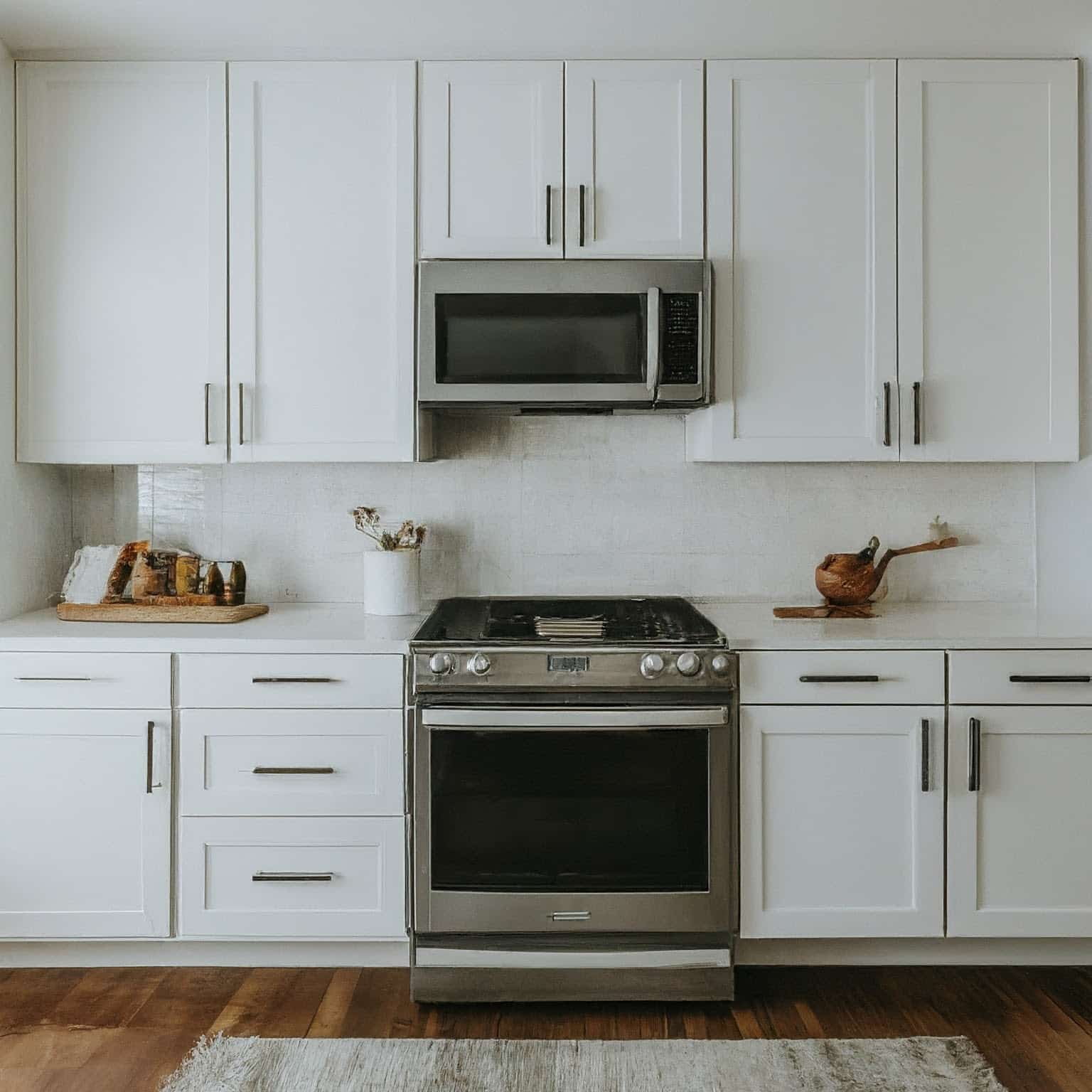
White and gray are undoubtedly the most popular colors for Shaker cabinets. They convey a clean, bright, and open feel that can make a kitchen or bathroom appear larger and more welcoming.
Black
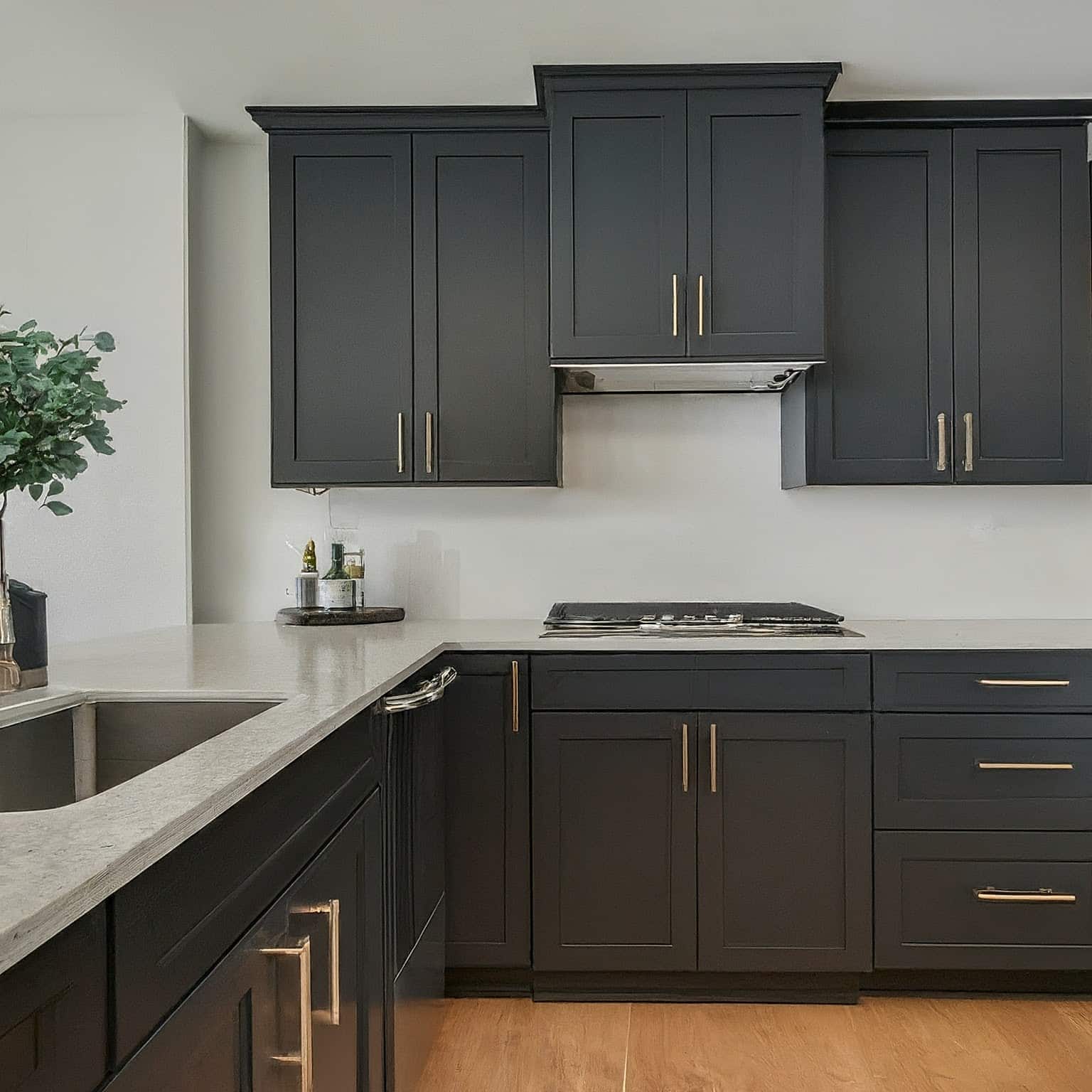
Black Shaker cabinets are a great choice for a bold, dramatic statement. These cabinets effortlessly add sophistication to any space, while their dark tint helps conceal dirt and stains.
Blue and Green
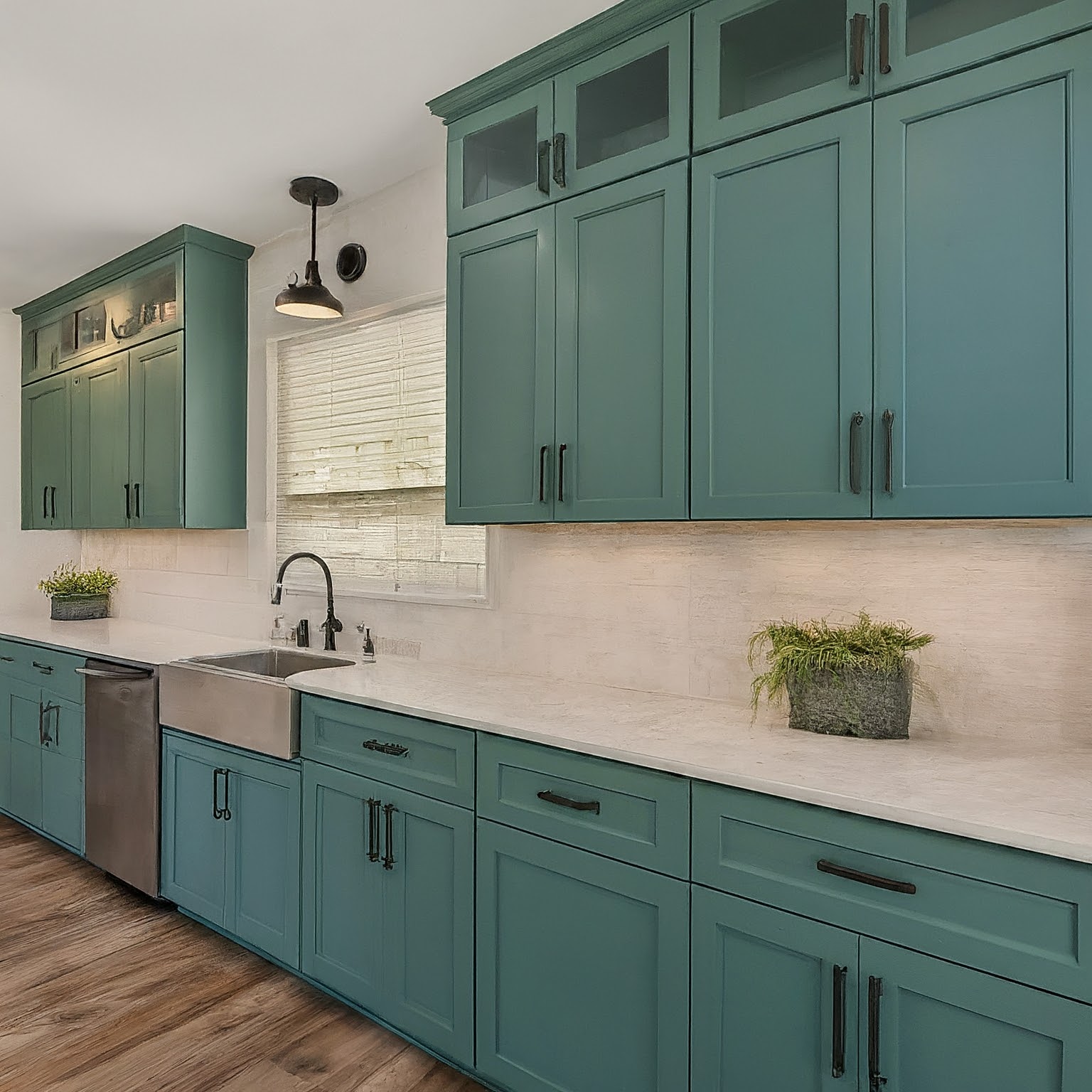
These colors offer a way to inject a vibrant dash of personality into your decor. Lighter shades can create an airy, expansive feel, while darker hues like navy or emerald can bring a touch of luxury.
As for wood options, traditional Shaker cabinets were made from hardwoods like maple, cherry, and birch.
Today, other materials such as Medium Density Fiberwood (MDF) offer alternative, more affordable options while maintaining traditional Shaker cabinets’ desired look and quality.
Tips for Selecting Hardware
Choosing the right hardware for your Shaker cabinets can greatly enhance their appeal and functionality. Considering the style and finish of your cabinet knobs and pulls can help complement your overall decor.
For a classic look, simple round knobs and bar pulls in finishes like brushed nickel, chrome, or bronze work well with Shaker cabinets. If you’re aiming for a contemporary vibe, choose sleek, minimalist hardware that preserves the clean lines of the cabinets.
Darker cabinets will generally contrast well with lighter hardware and vice versa. The hardware should not only coordinate aesthetically but also be comfortable and easy to use, enhancing the functionality of your cabinets.
Conclusion
Shaker-style cabinets have endured, consistently proving their worth with exceptional durability, practical functionality, and timeless elegance.
Their simple but distinct aesthetic can effortlessly complement a spectrum of interior design styles, making them a versatile choice for any home.
Homeowners love shaker cabinets for their timeless popularity and versatility, allowing them to fit various styles and aesthetics, including the option for partial overlay doors that many find appealing for their specific features.
The seemingly endless variations of Shaker cabinets, from traditional to modern designs, allow for personalized customization to reflect your taste and lifestyle.
Whether modern, farmhouse, or transitional, Shaker cabinets have proven compatible with various kitchen styles.
So, if you are pondering a kitchen or bath remodel, these stylistically adaptable, inherently durable, and visually appealing cabinets could be the answer.
With the right materials, finishes, and hardware choices, Shaker-style cabinets can transform your kitchen or bathroom into a space that truly reflects your style and meets your practical needs.
FAQs
Here are the most frequently asked questions about Shaker-style cabinetry.
What is the difference between shaker cabinets and other cabinet styles?
The difference lies mainly in their design and aesthetics. Shaker cabinets are known for their simple, clean lines and recessed center panels, making them distinctively minimalist compared to other cabinet styles, which often have more ornate designs.
Are shaker cabinets made with real wood?
Yes, traditional Shaker cabinets are made with real hardwood. However, you can find modern variations made from materials like Medium Density Fiberwood (MDF), which can be more affordable but still maintain the desired look and quality.
Is white shaker cabinetry still in style?
Absolutely! White shaker cabinetry continues to be popular for its classic, timeless appeal. Its clean, bright feel can make any kitchen or bathroom look more spacious and inviting, making it a preferred choice for many homeowners.
How do you identify quality shaker cabinet doors?
Quality cabinet doors are known for their sturdy construction. They typically feature a recessed center panel framed by four pieces of solid wood called rails and stiles. They should also have a smooth finish and precise joinery and, ideally, be made from quality materials like hardwood.

